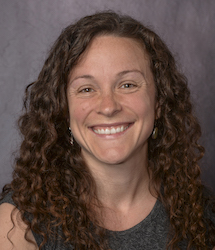ASLE’s Scholar of the Month for October 2022 is Jada Ach.
 Jada Ach is a Lecturer at Arizona State University, where she teaches in the Interdisciplinary Studies and Master of Liberal Studies programs. She is the author of Sand, Water, Salt: Managing the Elements in Literature of the American West, 1880-1925 (2021) and co-editor of Reading Aridity in Western American Literature (2020).
Jada Ach is a Lecturer at Arizona State University, where she teaches in the Interdisciplinary Studies and Master of Liberal Studies programs. She is the author of Sand, Water, Salt: Managing the Elements in Literature of the American West, 1880-1925 (2021) and co-editor of Reading Aridity in Western American Literature (2020).
How did you become interested in studying ecocriticism and/or the environmental humanities?
I didn’t set out to study ecocriticism when I started my PhD. In fact, I knew very little about it. During my first semester in the program, two of my professors assigned Frank Norris’s strange naturalist novel McTeague: A Story of San Francisco. As someone who loves the desert, I became fascinated (and a little annoyed) by the way Death Valley was depicted at the end of the novel. I just knew I had to write my final seminar paper on McTeague’s wanderings through the “impalpable alkali dust.”
That paper led me down all kinds of new and interesting research paths, including queer ecology, new materialism, infrastructure studies, and land management history. I had no idea that McTeague’s desert—and ecocriticism in general—could intersect with so many diverse themes, theories, and methods. I was hooked!
It was only when I started my job at ASU three years ago that I realized the work I was doing on deserts had a name: the desert humanities. It has been exciting to discover the small (but growing) community of folks from a range of fields who are thinking and writing about desert complexity in all kinds of innovative ways.
Who is your favorite environmental artist, writer, or filmmaker? Or what is your favorite environmental text? Why?
One of my favorite desert artists is Chip Thomas, physician and founder of the Painted Desert Project (PDP), whose collaborative murals and installations appear on abandoned buildings, billboards, and other structures along the highways of northeastern Arizona. The PDP “connects public artists with communities through mural opportunities on the Navajo Nation” and the broader Colorado Plateau region. Many of the PDP’s installations call attention to the disturbing and complicated history of uranium mining on Diné lands. “The Green Room,” located in Cameron, AZ, is one of the most powerful examples. I love sharing Thomas’s work in my interdisciplinary and liberal studies classes, as it gives students the opportunity to think about the diverse roles public art can play in social and environmental justice movements.
In terms of environmental/ecocritical texts, I’m always returning to Jane Bennett’s Vibrant Matter, Dina Gilio-Whitaker’s As Long as Grass Grows, and Traci Brynne Voyles’s Wastelanding.
What are you currently working on?
I’m currently collaborating with Megan Todd and Gary Reger to organize a virtual desert humanities dialogue series at ASU. The series would bring together writers, artists, land managers, and others with the goal of mapping out “interdisciplinary desert futures.” In terms of writing projects, I’m excited to be working on a paper that explores the emotional and cultural value of so-called “useless” desert rocks in Chloé Zhao’s Nomadland.
What is something you are reading right now (environmental humanities-related or otherwise) that inspires you, either personally or professionally? Comment briefly on why or how it inspires you.
Lately I’ve been revising an animal studies course I regularly teach, and for inspiration I returned to Aimee Nezhukumatathil’s World of Wonders: In Praise of Fireflies, Whale Sharks, and Other Astonishments. The book reads like an exercise in environmental attunement, and I can’t wait to share it with my students in the spring.
Is there a scholar in the field who inspires you? Why?
There are way too many to choose from! I’ll just say that the brilliant scholars who contributed to Reading Aridity in Western American Literature continue to inspire me to think about new and meaningful directions we can take in the desert humanities.
